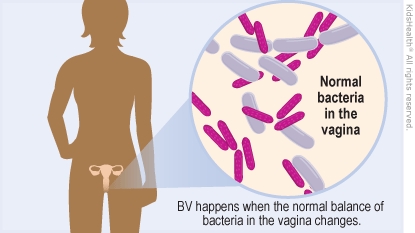Bacterial Vaginosis: Taking Care of Yourself
Bacterial vaginosis (sometimes called BV) is an infection in the vagina. It happens when the normal balance of bacteria in the vagina changes. Bacterial vaginosis is treated with antibiotics.


Treatment:
-
Use all prescribed antibiotics (pills, vaginal creams, gels, or suppositories) exactly as the health care provider recommended.
-
A vaginal cream, gel, or suppository can make condoms and diaphragms not work as well. Be sure to use another form of birth control until treatment is over. If you are having sex with guys, your partner(s) don't need to be tested or treated. If you are having sex with girls, your partner(s) should talk to their health care provider about testing and treatment.
Follow up:
-
Go for follow-up testing as recommended by the health care provider.
-
Get all doses of the human papillomavirus (HPV) vaccine (shot). HPV is an STD (sexually transmitted disease) that can lead to some kinds of cancer and genital warts.

-
You can't get or take the antibiotics.
-
You have new or worsening symptoms.
-
You are not getting better after a few days on the antibiotics.
-
You get better, but then symptoms come back (white or gray vaginal discharge, bad-smelling discharge).
-
You have signs of an STD (belly pain, fever, abnormal discharge, pain when peeing, or genital warts or sores).


Is bacterial vaginosis an STD? It isn't considered an STD. But the chances of getting it seem to go up with the number of sexual partners a girl has. Rarely, even girls who have never had sex can get bacterial vaginosis.
Does bacterial vaginosis lead to long-term problems? Not usually, but it does make a girl more likely to get an STD if she has sex with someone who has one. If a woman has untreated bacterial vaginosis during pregnancy, her baby has a higher risk of being born early or at a low birth weight.
How can I avoid getting bacterial vaginosis again? You can lower your risk of getting bacterial vaginosis again by: